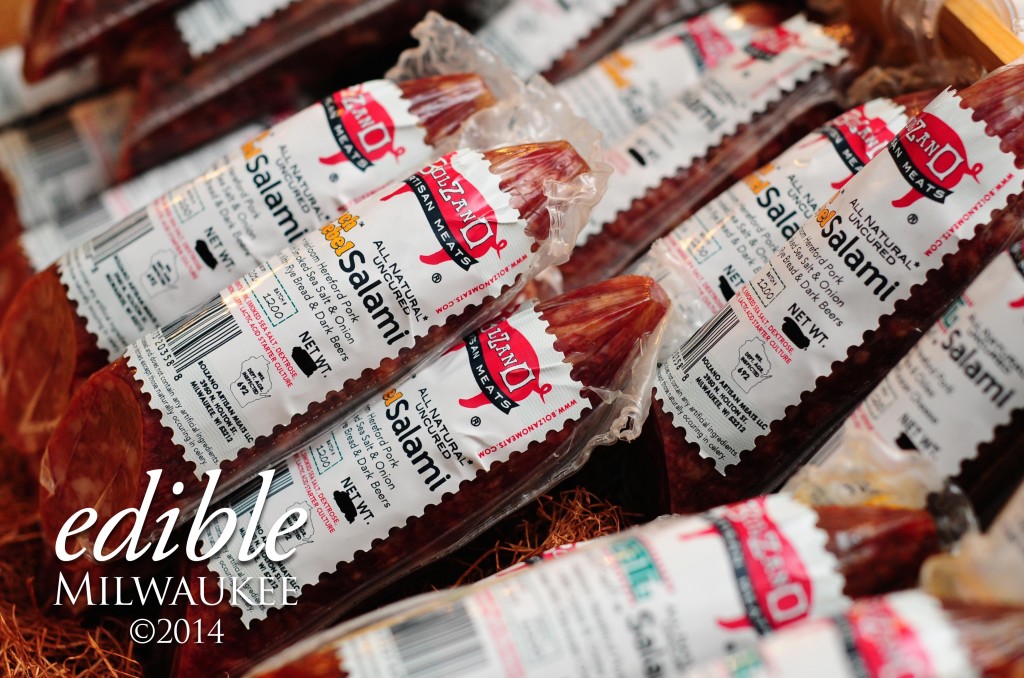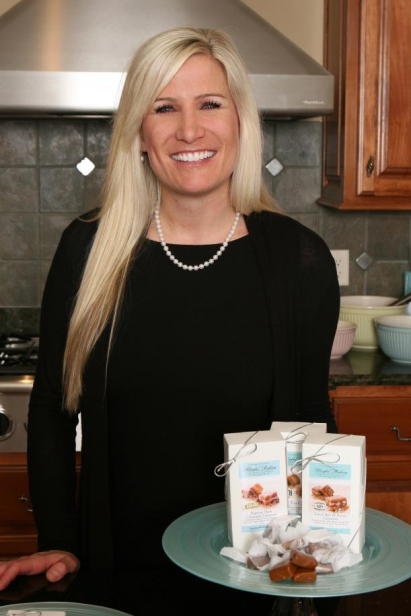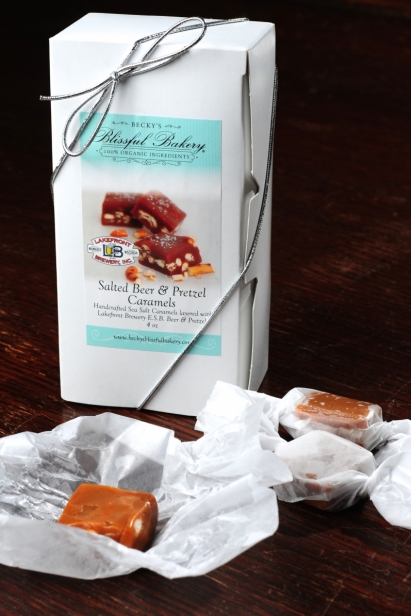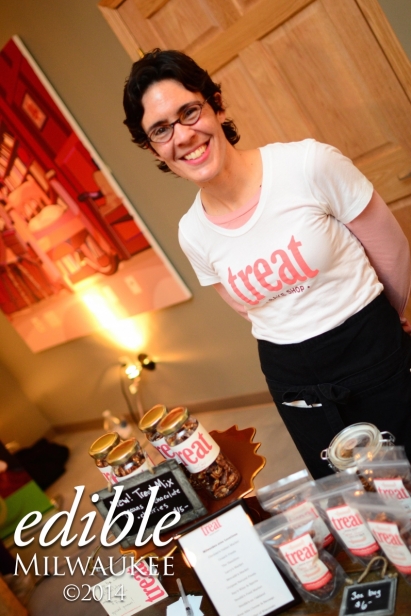Growing Pains For Local Entrepreneurs
Scaling up creates raft of hurdles for small food businesses
Scott Buer was all smiles during the Eat Local Resource Fair last August at the Urban Ecology Center in Riverwest. Offering samples of dry-cured salami to patrons and sharing the story of Bolzano, the business he and his wife Christin launched in 2009, was evidently an act of pure joy. Few attendees could resist a visit to their booth, wanting to meet the guy with the prized handlebar mustache and taste that artisan charcuterie that spent months in the making.
The media, too, boldly sang the praises of the beloved Milwaukee company, for being one of the few meat producers in the nation to make salami the old-fashioned way, handcrafting every batch from locally raised heirloom hogs.
So it came as a shock to the community—and to the Buers—this past spring when the USDA issued a recall of more than 5,000 pounds of Bolzano salami—one that had little to do with safety concerns, and everything to do with labeling.
The USDA stated the “products being recalled incorrectly bear the Cooperative Interstate Shipment (CIS) program version of the USDA Mark of Inspection, which requires federal acceptance into the program.” (Incidentally, the CIS program designed to help small producers ship across state lines was one of the influencing factors in the couple’s decision to start their company in the first place, they say.) The Buers applied for the program and claim to have taken all the necessary steps prior to the labeling in question, but the USDA’s Food Safety Inspection Service argued that Bolzano was not admitted into the CIS at the time of recall.
Dismissing Bolzano’s efforts to comply with state and federal regulations, the Wisconsin Department of Agriculture, Trade and Consumer Protection (DATCP) suspended Bolzano’s license, and the company—having lost about $50,000 worth of product in the recall—closed its doors, becoming the poster child for small business victims of rigid policies.
“Regulations vary hugely from industry to industry, and meat inspection is by far the hardest,” says Scott. “We spend hundreds of hours and thousands of dollars every year on regulatory issues.”
Both Scott and Christin are well-read on DATCP policies, but that didn’t shield their business from being governed by regulations critics say are deliberately opaque.
“By just reading rules and regulations one finds issues that are almost never enforced, and some obscure ones that are,” says Scott Buer. “I guess it’s like this with any code of law, but the DATCP, in our opinion, has a dysfunctional culture at present.”
Rebecca Scarberry can relate to these frustrations. Her Pewaukee company, Becky’s Blissful Bakery, uses only organic ingredients to make handcrafted gourmet caramels. But a recent change in the front and back panel labeling codes prevents her from being able to claim “made with organic ingredients” on the package without the proper (and expensive) certification. To comply, she needs to re-design and create new labels specifying each organic item in the ingredients list. “I’ll have to change my logo, too,” she says. “It can be frustrating when you’re doing all the right things… and then suddenly those things change.”
But both business owners agree it’s all part of consumer safety, and as for Scarberry’s organic label, she’s hoping to have the certification process complete by fall, a deadline she wasn’t anticipating, but is determined to meet so she can qualify for an $800 refund. “It’s a lot of paperwork, but if I want to take advantage of this government offer, I’ve got to get it done,” she says. Paperwork is something she’s grown accustomed to since opening her business in 2007: applying for and renewing licenses, submitting vendor applications for markets and events, not to mention the hours of daily documentation, detailing everything from how allergens are handled to the types of cleaning products used to recording logs for dates, times and temperatures, as well as maintaining an updated written recall procedure.
And then there’s actually making the caramel and marketing it to consumers and wholesalers. “People always ask me how I eventually landed a deal with Willams-Sonoma,” she says. “I did my homework. I tracked down the buyer and sent them samples of my product.” Scarberry makes it sound easy, but she knows all too well the growing pains of scaling up a small business. Just ask her about the time she had to sell her minivan to help fund the build-out of her own kitchen space—all the while recovering from an emotional divorce. “Banks weren’t about to dish out a loan to a single mom with a start-up candy company,” she remembers. “I had to figure out a way to make it work.”
Scarberry has a degree in business management, “but that doesn’t help me start a food company in Wisconsin. I tell people it feels like I set off for a walk in a sundress and flip-flops and ended up climbing Mount Everest.”
But unlike the 50 percent of small businesses that fail within the first year, Scarberry cleared the hurdles, crediting getting up the proverbial mountain to Waukesha County Technical College (WCTC), where she took advantage of affordable training in small business growth strategies. Staying in close contact with the mentors she met at WCTC, Scarberry used the knowledge she gained to start a workshop specific to food entrepreneurs. The course, How To Start a Food Business, is still being offered at the campus for a small fee (around $17).
For Yollande Deacon, having an MBA from Marquette gives her an edge in growing her Milwaukee food company, Afro Fusion Cuisine. But education is only one of four pillars she cites as supporting the expansion of her Wisconsin business. “Number one is self-discipline,” says Deacon. “It’s a lot of work just to familiarize yourself with government regulations and licensing.” Number two, she says, is having financial resources. Deacon currently rents kitchen space by the hour, with a goal of one day building her own facility—an investment she estimates could cost around $100,000. Community infrastructure is the third pillar, where Milwaukee’s available commercial kitchens and help centers for new entrepreneurs are lacking. “I should be able to name more resources for food producers and more commercial kitchens,” she says. Finally comes an understanding of business: “I have to be my own chief marketer, my own chief financial officer, my own chief supplier, my own chief cook. I’m my own delivery person, I package my own products—now you see what I mean about self-discipline?”
Deacon has it all—a perfect quartet of traits essential for nurturing a young food company— but in bringing her idea for a line of African- and Jamaican-inspired cuisine to life, she was met with a homegrown challenge. “Many people in Wisconsin are not familiar with this kind of ethnic food. I have to first educate the community.
Essentially, I have to create my own demand.” It’s a feat she managed by marketing her products to Milwaukeeans as a cultural experience. “I’m bringing my customers a taste of Africa and Jamaica,” she says, “and I do it with locally-sourced produce. People want something different. But it has to be honest.”
It’s all part of having a relationship with the community and a keen sense of direction. After all, starting a small food company may not be the road less traveled, but it’s always going to be under construction.
The Changing Face(book) of Business
Expanding a small food company within legislative and financial boundaries requires an entrepreneur to be both flexible and resourceful, tapping into a host of platforms to reiterate brand messaging and attract new business. Here’s how some artisan food producers approach modern strategies for spreading the word:
Social Media
To pin or not to pin? Small business owner Sarah Feldner maintains a modest Facebook and Pinterest account for her Milwaukee-based spiced nut company, Treat Bake Shop, and you won’t find a link to Twitter on her homepage. But you will find her locally made pecans in more than a dozen states. “I don’t live and die by social media. It’s a great way to connect and communicate with the community, and it’s a great way to get ideas and see what other artisans are doing,” but sometimes you have to stay focused on your company’s own picture, she says.
As for Bolzano, fans and followers relied on Facebook and Twitter to get the scoop after news broke of their closing. “Social media has helped us get our story out. The people we are not getting along with think news about actions against us is going to shame us, but it’s actually leading to people and businesses questioning what is going on with Wisconsin regulation,” says co-owner Scott Buer. “Plus, now we have a huge outpouring of interest from potential investors and are talking with a few local food companies about merging our operations. Our mission is to make a comeback.”
Virtual Store Fronts
Treat Bake Shop is not the kind of “shop” you can swing by on your way home from work. In fact, before her spiced pecans were on store shelves, Feldner’s specialty snacks were only available for purchase on her website, thetreatbakeshop.com. “To quote another entrepreneur, ‘overhead can kill your dream,’” she says. “Until you can prove people want your product, are willing to buy it more than once, and that your business can turn a profit, you should not spend any money [on real estate] unless it is an absolute necessity for the business to function.”
Crowd Funding
Sites such as kickstarter.com and indiegogo.com are known for helping to fund ideas for start-ups, but for Bolzano, it wasn’t a platform to pitch a new product. “Ours wasn’t a campaign; it was an emergency cry for help. We had some great support from our indiegogo.com contributors, but it wasn’t a magic bullet like crowd funding can end up sounding like in the media,” says Buer.
Local Networking
Everyone needs a co-pilot from time to time, and Wisconsin small businesses are no exception—especially while navigating a legislative map marked with intimidating barriers.
Networks like the Wisconsin Artisan Food Producers and Local First Milwaukee help connect like-minded entrepreneurs in a supportive community where it’s ok to ask for directions.
“It’s important for us to have a positive attitude about regulation,” Buer says, “but know that just simply starting a food company can be taken as a legal challenge by some. Owners need to know they’re not alone,” and that staying active in food politics and up-to-speed with regulatory issues “can affect local food as much—or more—than the weather, or even fun new food trends.”
Community Resources
To learn more about starting or growing a small food business, check out the Waukesha County Technical College’s How to Start a Food Business workshop, at wctc.edu, or browse the classes offered through University of Wisconsin-Milwaukee’s Small Business Development Center, at www4.uwm.edu/sce. Courses run through the fall and are open to the public.












